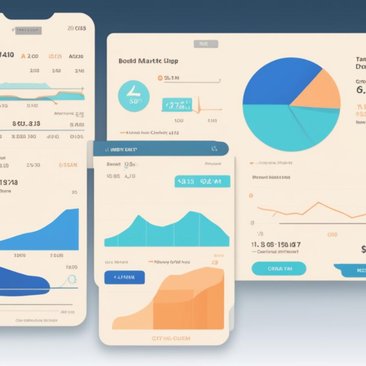Technology Goals
FastAPI is a modern web framework built with Python, designed to create fast, scalable APIs with minimal code. It is known for its high performance and ease of use, enabling developers to build production-ready APIs quickly and efficiently. FastAPI supports asynchronous programming using Python’s async and await features, making it well-suited for building high-performance APIs that handle a large number of requests concurrently.
FastAPI stands out for its ability to automatically generate interactive API documentation using OpenAPI and Swagger UI. This allows developers to build, test, and share their APIs with ease, reducing the time spent on manual documentation. It also supports automatic validation of request and response data using Python’s type annotations, helping to catch errors early in the development process.
FastAPI is often used for building RESTful APIs, microservices, and asynchronous applications due to its lightweight, non-blocking nature. Its speed is comparable to frameworks like Node.js and Go, making it an attractive choice for performance-conscious developers.
Strengths of FastAPI in Our Projects
FastAPI offers several key advantages for web development, especially in building APIs:
- High Performance: FastAPI is designed for performance. It is one of the fastest Python web frameworks available, comparable to more traditionally high-performance frameworks like Node.js or Go. This performance is largely due to its use of asynchronous programming, allowing it to handle many requests simultaneously without blocking.
- Asynchronous Programming: FastAPI supports Python’s
asyncandawaitsyntax, enabling the creation of non-blocking endpoints. This makes it ideal for building APIs that need to handle high concurrency, such as real-time applications or systems that interact with multiple external services. - Automatic Data Validation: FastAPI automatically validates incoming request data using Python type hints and the Pydantic library. This ensures that the data passed to API endpoints is of the correct type and structure, reducing the chances of runtime errors or invalid data.
- Interactive API Documentation: FastAPI automatically generates interactive API documentation using Swagger UI and Redoc. This feature allows developers and stakeholders to explore and test the API endpoints directly in the browser, simplifying testing and collaboration. The documentation is generated based on the API’s OpenAPI schema, ensuring that it is always up-to-date.
- Ease of Use and Rapid Development: FastAPI’s clean and intuitive API makes it easy for developers to write readable, concise code. Its automatic validation and documentation generation features significantly reduce the amount of boilerplate code, allowing developers to focus on business logic rather than repetitive tasks.
- Security Features: FastAPI has built-in support for modern security standards such as OAuth2 and JWT (JSON Web Tokens), making it easy to implement secure authentication and authorization mechanisms for APIs.
Comparison with Other Web Frameworks
- FastAPI vs. Flask: Flask is one of the most popular Python web frameworks, known for its simplicity and flexibility. While Flask is excellent for small projects and provides more control over how developers structure their applications, FastAPI offers automatic validation, asynchronous support, and auto-generated documentation, which are not natively available in Flask. FastAPI is more suitable for building larger, scalable APIs due to its performance optimizations and asynchronous capabilities.
- FastAPI vs. Django: Django is a full-stack web framework that comes with a lot of built-in features, including ORM (Object-Relational Mapping), templating, and an admin panel. Django is ideal for building full web applications but can be overkill for API development. FastAPI, on the other hand, is focused on API development, offering better performance for API-heavy projects, especially when asynchronous tasks or microservices are required.
- FastAPI vs. Node.js (Express): FastAPI offers performance on par with Node.js-based frameworks like Express while providing Python’s ease of use and type safety. Both are great for building APIs, but FastAPI’s automatic type validation and documentation generation provide an advantage in terms of development speed and reducing bugs.
Real-world Applications in Client Projects
- Real-time Data Processing API: For a client requiring real-time data processing from multiple external sources, FastAPI was chosen to build an asynchronous API that handled large volumes of incoming data requests. The use of Python’s
asyncandawaitfeatures allowed the API to scale and handle thousands of requests per second, ensuring real-time updates with low latency. - Microservices Architecture: In a microservices-based architecture, FastAPI was used to build lightweight and efficient RESTful services that interacted with a larger system. The speed and asynchronous nature of FastAPI made it easy to build microservices that could handle high-concurrency requests while maintaining performance and reliability.
- Machine Learning API: FastAPI was integrated into a machine learning project, where it served as the backend for serving machine learning models in production. The built-in data validation ensured that incoming data was structured correctly for the models, while the auto-generated API documentation simplified testing and integration with other services.
Client Benefits and Feedback
Clients using FastAPI have experienced faster development cycles and improved performance for their APIs. One client in the fintech industry praised FastAPI’s speed and scalability, noting how it allowed them to handle a high volume of real-time transactions efficiently. Another client appreciated the automatically generated documentation, which made it easier to collaborate with developers and external partners during the integration phase.
Clients also highlighted how FastAPI’s support for asynchronous programming helped reduce server response times, even when handling heavy traffic or complex business logic, making it an excellent choice for real-time applications.
Conclusion
FastAPI is a modern, high-performance web framework that excels in building fast, scalable, and reliable APIs. Its support for asynchronous programming, automatic data validation, and interactive documentation makes it an ideal choice for both small APIs and large, production-ready services. Whether used for microservices, real-time data processing, or serving machine learning models, FastAPI offers the tools and performance needed to create efficient and maintainable APIs in Python.











